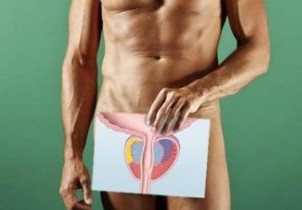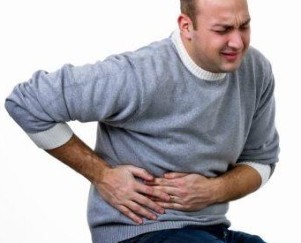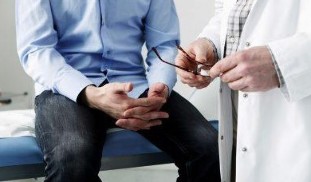An inflammation of the prostate gland is a serious disease that can lead to serious consequences if left untreated. The Prostate gland, located just below the bladder.
When it becomes inflamed, it increases significantly in size, blocking the neck of the bladder, and obstructs the outflow of urine. That's why when the first symptoms and manifestations, it is necessary to immediately consult a specialist to identify and begin treatment of prostatitis.

The main symptoms are: what is prostatitis?
It used to be that it is a disease of elderly men, however, in the modern conditions of life (environment, quality of the food, the fashion, the negligence of the attitudes of young people towards health, and the constant movement of the car, etc.) an inflammation of the prostate gland is a much "younger".
The incidence of young people under the age of 18 years of age, and 5% in the age group of 18 to 30 years of age – 45%, between 30 and 50 years of age – 20% of the more than 50 years of age – 30%. This means that to keep an eye on my men's health, and listening to the symptoms it is necessary at a young age.
There are several types of prostatitis on the form of the manifestation of (chronic, acute), and infections (bacterial, stagnating, festering, however, calculous). The symptoms of the disease vary, depending on the type of inflammation of the prostate gland in men.
The symptoms of acute prostatitis:
- feeling unwell (nausea, chills, fever). People may be starting to drop, then warm, then cold. Symptoms are similar to the manifestations of SARS, or the flu;
- a sharp increase in body temperature to subfebrile level (37,5-38 C) and above;
- the strong, cutting, stabbing pain in the perineum (the area of the groin, anus, etc.);
- the pain in the lower back, the hips, giving both of your legs, the knees, the feet or the leg muscles;
- a sharp pain, which occurs during defecation and straining;
- problems urinating (low, frequent urination, painful or difficult urination). Holding the urine for a longer period of time (over 12 hours);
- the deterioration of sexual function (the weak or no erection, ejaculation, difficulty with conception);
- discharge from the genitals (in the most severe cases of prostatitis).
Chronic prostatitis symptoms:
- urinary problems (difficulty in urinating, pain in the improper discharge of urine, feeling of incomplete emptying of the bladder, etc.);
- the unpleasant nagging pains and sensations in the perineum, between the legs, in the groin, the anus. The pain syndrome is not the speaker's;
- the groin it may be sharp pain or an intense burning sensation, changes in the crotch;
- A general malaise for an extended period of time (lethargy, apathy, depression, constant fatigue, muscle weakness, etc.);
- nervousness, irritability;
- a slight increase in the temperature of the body. Sometimes, you think you can keep a low-grade fever;
- decreased sexual function (erection difficulties, reduction in, or absence of ejaculate volume, decreased libido, infertility, etc).

Chronic prostatitis requires, such as periods of remission and relapse. During the period of recurrence of the symptoms of the chronic form may develop the symptoms of the acute form of the disease.
The symptoms of bacterial forms, as follows:
- the signs of an infection (fever, chills, fever, General weakness, pain in muscles and bones);
- the signs of the local inflammation of the prostate gland (pain in the perineum, groin, anus);
- the problem of urination;
- changes in the consistency, color and odor of the fluid (urine, prostate secretion, sperm, blood).
Symptoms of the calculous form:
- low-and moderate-syndrome of pain in the lower part of the back, a sacral Section, of the perineum, the anus;
- nagging pain and a burning sensation in the perineum, the groin;
- the pain greatly intensified after intercourse and during active movement;
- problems with urination, feeling of fullness of the bladder;
- decreased libido, problems with ejaculation and erection (by erectile dysfunction);
- in more extreme cases, the sperm count can result in a drop of blood (that is, turned into a bright pink, or bright red).
The symptoms of congestive forms:
- persistent pain in the groin, the perineum, and the anus;
- periodic nagging pains in the perineum;
- troubled urination, and the feeling is not the end of the inanis of the bladder;
- a steady increase in the temperature of subfebrile level.
- manifestations of shared inflammatory process in the body (increased erythrocyte sedimentation rate in the blood, weakness, drowsiness, fatigue, headache, nausea, muscle aches, etc.);
- problems in the sexual front, weak erection and ejaculation, infertility);
- nervous condition, depression, apathy.
The symptoms of the infectious forms:
- the signs of inflammation in the body (the higher the value of the ESA in the blood, male, muscle aches, fever);
- the pain, the pain in the low back, the groin and the perineum;
- pain during a bowel movement;
- a sharp pain in the groin and the perineum;
- difficulty with urination (difficulty, frequent urination, lack of urination, etc.).
The symptoms of a purulent form:
- a sudden severe fever (above 38, 5 degrees);
- the signs of inflammation in the body, high EFF, muscle aches, fever, chills, etc.);
- distinct syndrome of pain in the groin, the perineum, and the anus;
- a sharp pain in the perineum;
- difficulty urinating, painful urination;
- purulent discharge from the genitals.
What are the first symptoms in men?
When it comes to the inflammation of the prostate gland in the male there may be only a part of the symptoms. The signs of the start of an inflammation of the prostate gland, you should pay special attention to:

- unpleasant sensations in the perineum;
- regularly a weak dragging pain in the groin and the perineum;
- nagging discomfort in the anus and in the rectum in defecation (in the absence of the hemorrhoids);
- long a weakness, which is related to SARS, sore throat, the flu and other common colds;
- decreased libido, failure of ejaculation, and ejaculation (periodic shortages);
- the decline in the quality of it;
- the discomfort in the urethra, and the groin area during a sexual activity, or sex;
- changes in the consistency, color and smell of sperm;
- the increase of the temperature of the body.
Marked signs of acute prostatitis:
- a rise in temperature to 37,5-40 degrees for no apparent reason (no colds, no flu, no sore throat);
- the frequency of urination is increased by 3-4 times and is accompanied by a sharp pain. The urine flows slowly, with modest pressure;
- burning in the groin, the perineum, and the movement of the bowel. The pain in the rectum during defecation;
- the allocation of the pus from the rectum, or the urethra (where the severe purulent form of the disease).
Marked signs of chronic inflammation of the prostate gland:
- a burning sensation in the groin, and perineum. A burning sensation in the genitals (especially during urination and sex.);
- purulent discharge from the urethra, after urinating, and straining (either an active or a tomb). Purulent discharge of the rectum;
- nervousness, depression, irritability;
- fatigue for no apparent reason, lethargy.
The pain, the inflammation of the prostate gland
Almost always, when there is an inflammation of the prostate gland, a man may find himself, on the causes of the pain syndrome in the subject. The typical nagging, aching, or sharp pain in the perineum and in the groin. In the acute form, or when a relapse of the chronic form of the disease, and the pain are characterized as acute, sharp, severe pain, slitting and pulling the. In the chronic form of the disease, the pains are periodic, wave-like in nature. Also, the pain may be mild, but constant. An inflammation of the prostate affects the urethra, bladder neck, and in your ureters. It channels urine from the bladder, which may occur painful urination. Also, the pain during urination could be a sign of an infection of the bladder or urogenital system disease, sexually transmitted disease, sexually transmitted diseases).
Accompanied by pain, you can have a completely different reason. As well as the presence of multiple co-prostatitis pain can be very inflammation of the prostate gland, and a host of other diseases.
The other reasons that accompany the pain:
- the pain in abdominal pain is a symptom of many other diseases. A good example of this is appendicitis, acute poisoning, irritation of the bowel, or interfaith.
- The lower back may be hurting because of a herniated, degenerative disc disease, pinched nerve, osteoporosis, multiple sclerosis, and other diseases of the spinal column.
- the pain in the anus may be caused by hemorrhoids, fissures, abrasions, for a long time, sitting on the uncomfortable, hard surface, and in a variety of tumors (benign or malignant).
- The pain syndrome of the lumbosacral spine is more severe. Most often, it is a problem with the bones of the vertebrae and the discs (osteochondrosis, osteoporosis, displacement, entrapment, etc.).

Sometimes, pain in the sacrum indicate a problem with the internal organs (kidneys, intestines, bladder, and your ureters), gynecological disease, thrombophlebitis, the inflammation of the pelvic organs.
- A painful foot can be the meaning of the phrase a straight leg, thrombosis, atherosclerosis, varicose veins, arthritis, osteoporosis, sciatica and even diabetes. Do you have pain in your legs can be a variety of reasons.
The most common is a weariness of the legs, and the muscles of the long-term physical activity.
What specialist deals with the treatment of the disease?
For the diagnosis of the patient, the inflammation of the prostate gland is only by a qualified urologist. He collects the medical history and examination of the patient. Then send your man to the test (PSA antigen – a protein for detection of the prostate gland and an ultrasound of the pelvic organs.
Also, the patient is mandatory in the lease of General blood and urine. The results of all the tests the urologist may be specified by the diagnosis and the form of the inflammation of the prostate gland. It is only after these procedures, the doctor may prescribe a patient-individual treatment, including drugs, antibiotics, and other drugs, which are usually in the home.
A man in 95% of cases, knows exactly what the diagnosis will put a doctor because of the pain, the inflammation of the prostate gland is very specific. You have to constantly listen to your body, and to keep track of all the changes that are occurring in the body. The only way a man can for years to maintain your men's health. Started the prostatitis is a threat not only to the disorder of urination, problems with libido, ejaculation, erection, that, in the final phase, it can lead to infertility.
























